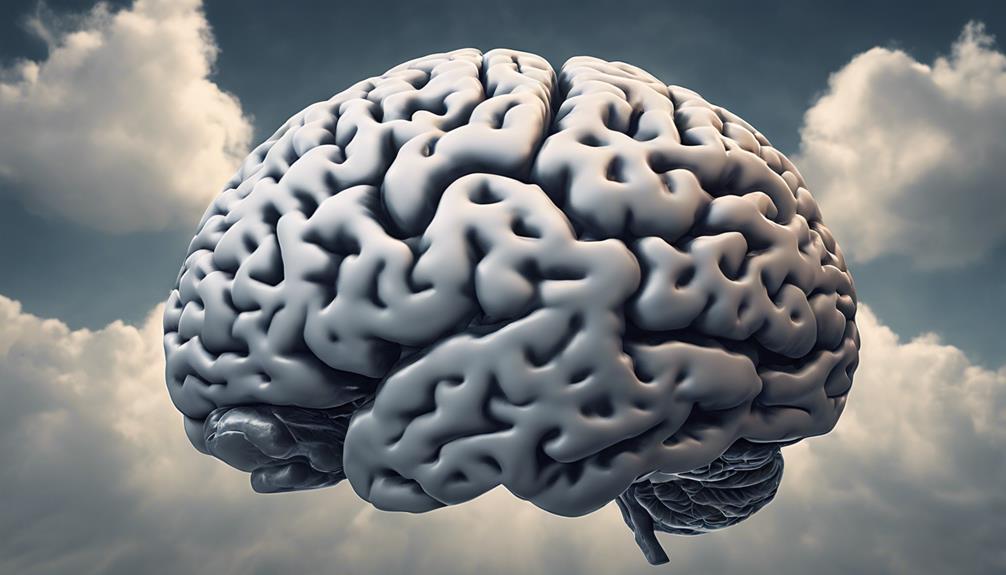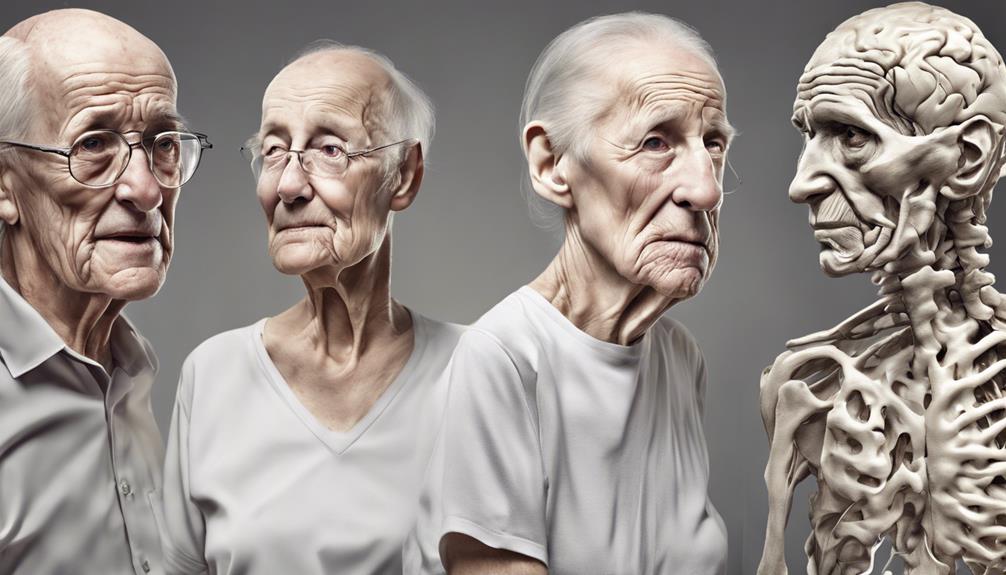As we strive to understand the complexities of Lewy Body Dementia, we come face to face with a harsh truth: navigating through its seven stages means slowly descending into a world where cognitive abilities are constantly tested.
From the initial subtle hints of cognitive decline to the profound impact on daily life in the later stages, each phase unravels a different facet of the disease's progression.
Understanding these stages is crucial, as it sheds light on the evolving needs and care requirements for individuals grappling with Lewy Body Dementia.
Key Takeaways
- Early signs include memory issues, confusion, visual hallucinations, and behavior changes.
- Progression to middle stage involves significant memory loss, worsening confusion, and motor issues.
- Challenges in later stages include severe memory loss, movement problems, and increased hallucinations.
- Caregiver support crucial throughout disease progression; vigilance and understanding are essential.
Early Stage Symptoms
During the early stages of Lewy Body Dementia, individuals may exhibit subtle memory issues and occasional confusion. These initial symptoms often indicate mild cognitive decline, which can progress over time.
Cognitive fluctuations, where individuals experience periods of lucidity followed by confusion, are common in the early stages. Visual hallucinations may also occur, leading individuals to see things that aren't present.
Changes in motor function, such as tremors or stiffness, can manifest early on in the disease progression. Additionally, family members may notice subtle alterations in the individual's behavior or mood, which can be distressing for both the person with dementia and their loved ones.
Seeking medical evaluation and monitoring during this stage is crucial to accurately diagnose Lewy Body Dementia and develop an appropriate care plan. Early intervention and support can help manage symptoms effectively and improve the quality of life for those affected by this condition.
Progression to Middle Stage

As individuals progress to the middle stage of Lewy Body Dementia, pronounced cognitive decline becomes evident, posing increasing challenges in daily tasks. Here are four key aspects to consider during this stage:
- Memory Loss: Significant memory impairment is a hallmark of the middle stage of Lewy Body Dementia. Individuals may struggle to remember recent events, forget names of close family members, and have difficulty recalling familiar places.
- Confusion: The level of confusion experienced by individuals with Lewy Body Dementia escalates in the middle stage. This confusion can lead to disorientation, trouble recognizing familiar surroundings, and difficulty following conversations.
- Problem-Solving: Impairments in problem-solving abilities become more pronounced during this stage. Simple tasks that require planning and decision-making may become increasingly challenging for individuals with Lewy Body Dementia.
- Visual Hallucinations and Motor Function Issues: Visual hallucinations and motor function problems may worsen in the middle stage. These hallucinations can be distressing, and motor issues may impact balance, coordination, and mobility, requiring additional support and care.
During the middle stage, the care needs of individuals with Lewy Body Dementia increase, necessitating more assistance with daily living activities. Additionally, behavioral changes, mood swings, and sleep disturbances are common features that caregivers and healthcare providers should be prepared to address with understanding and compassion.
Challenges in Later Stages
In the later stages of Lewy Body Dementia, individuals typically experience a profound deterioration in cognitive function, necessitating comprehensive assistance with all aspects of daily living. Cognitive decline becomes severe, leading to significant memory loss and confusion. Motor dysfunction worsens, impacting movement control and coordination. Behavioral changes, hallucinations, and delusions may become more pronounced. Caregiver support becomes crucial as the disease progresses, with an increased risk of complications like infections and falls.
| Challenges in Later Stages | |
|---|---|
| Cognitive Decline | Severe memory loss and confusion |
| Motor Dysfunction | Worsened movement control and coordination |
| Behavioral Changes | Increased hallucinations and delusions |
In the advanced stages of Lewy Body Dementia, individuals face significant challenges that necessitate specialized care and support. Caregivers play a critical role in managing the complex symptoms and reducing the risk of complications such as infections and falls. Providing a safe and nurturing environment becomes paramount in ensuring the well-being of individuals with Lewy Body Dementia.
Fluctuating Cognitive Function

Fluctuating cognitive function in Lewy Body Dementia presents unpredictable shifts in memory, attention, and thinking abilities, impacting daily functioning significantly.
- Patients with Lewy Body Disease may experience periods of clarity where they seem alert and oriented, only to swiftly transition to sudden confusion or disorientation.
- These fluctuations can occur multiple times within a day or over several days, making it challenging for individuals with Lewy Body Dementia to predict and manage their cognitive abilities consistently.
- The abrupt changes in cognitive function can disrupt daily activities such as meal preparation, medication management, or even personal hygiene routines.
- Caregivers and healthcare providers must remain vigilant and adaptable, as they need to adjust their support strategies and communication techniques based on the individual's current cognitive state to ensure safety and well-being.
Understanding the nature of fluctuating cognitive function in Lewy Body Dementia is crucial for delivering effective care and support to those affected by this condition.
End-of-Life Considerations
End-of-life considerations in Lewy Body Dementia encompass the management of symptoms and the maintenance of quality of life during the advanced stages of the disease. As symptoms progress, palliative care plays a crucial role in ensuring comfort and dignity for individuals with Lewy Body Dementia.
Advance care planning becomes increasingly important to outline preferences for medical treatment and end-of-life wishes. Hospice services may be recommended based on the patient's condition, providing specialized end-of-life care tailored to their needs.
Family involvement is paramount during this phase, offering emotional support and practical assistance to both the individual and their loved ones. By prioritizing comfort, dignity, and respecting end-of-life wishes, the focus shifts towards enhancing the quality of life in the final stages of Lewy Body Dementia.
Through a collaborative approach that involves healthcare providers, families, and caregivers, individuals can experience a sense of peace and comfort as they navigate this challenging phase.
Frequently Asked Questions
What Are the 7 Stages of Lewy Body Dementia?
We'll share key details about the 7 stages of Lewy Body Dementia. These stages range from no cognitive decline to very severe cognitive impairment. Each stage marks a progression in cognitive decline, necessitating tailored care and support.
Stage one involves no cognitive impairment, while stage two includes very mild cognitive decline.
Moderate cognitive decline occurs in stage four, and stage seven signifies very severe cognitive decline, the final stage of Lewy Body Dementia.
Can Lewy Body Dementia Get Worse Suddenly?
Yes, Lewy Body Dementia can worsen suddenly, causing rapid declines in cognitive function, motor skills, behavior changes, hallucinations, and mobility issues. Caregivers must be vigilant for abrupt changes and seek medical advice promptly.
Monitoring for sudden deteriorations and adjusting care plans accordingly is vital in managing the unpredictable progression of Lewy Body Dementia. Early recognition and intervention are crucial in providing optimal care for individuals with this condition.
What Are the End of Life Symptoms of Lewy Body Dementia?
End of life symptoms of Lewy Body Dementia can include severe cognitive decline, memory loss, confusion, hallucinations, delusions, and behavioral changes. Individuals may struggle with daily tasks and require extensive assistance with all aspects of living.
Sensitivity to medications increases, and cognitive abilities fluctuate. Heightened risk of infections and falls can occur. As the disease progresses, the need for support in daily living grows significantly.
What Are 3 Signs of Lewy Body Dementia?
We can identify Lewy Body Dementia by fluctuating cognitive abilities, visual hallucinations, and changes in motor function.
Fluctuating cognition involves varying levels of alertness and attention. Visual hallucinations manifest as seeing shapes, animals, or people that aren't present. Changes in motor function may include slowed movement, tremors, and muscle stiffness.
These signs collectively contribute to the diagnosis of Lewy Body Dementia.
Conclusion
As we navigate the 7 stages of Lewy Body Dementia, we witness the gradual decline in cognitive abilities and the challenges it brings to daily living.
Through early recognition and appropriate management, we can strive to improve the quality of life for individuals with this condition.
Let's remember that amidst the difficult journey, there's a glimmer of hope that shines through the darkness, guiding us towards better understanding and compassionate care.









